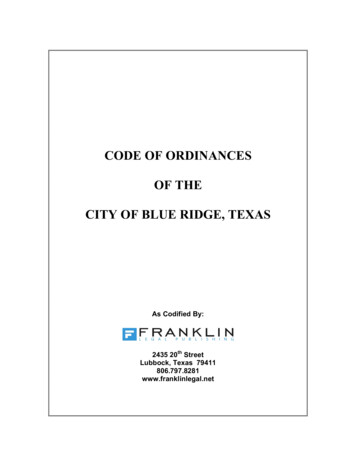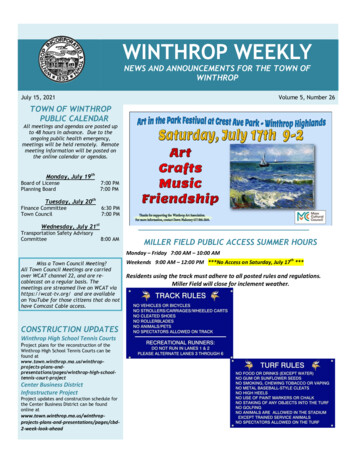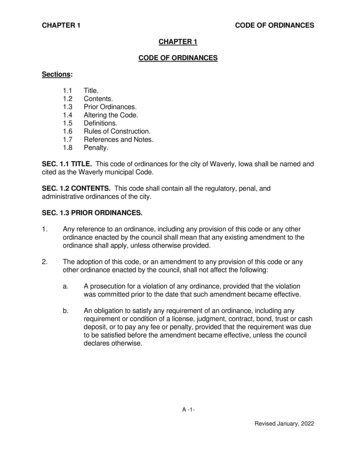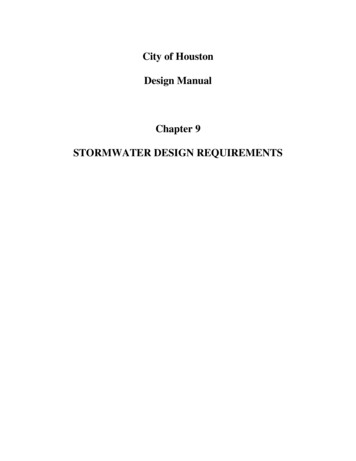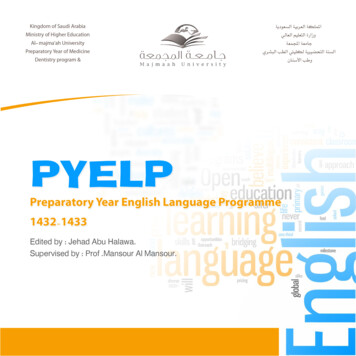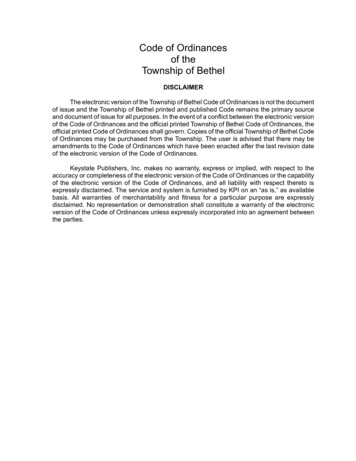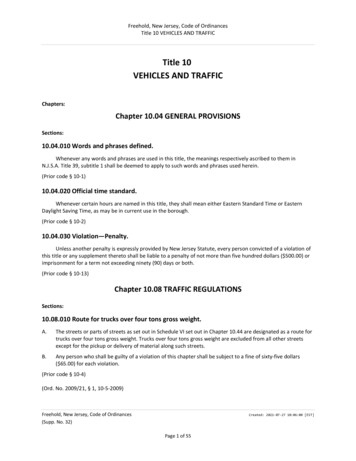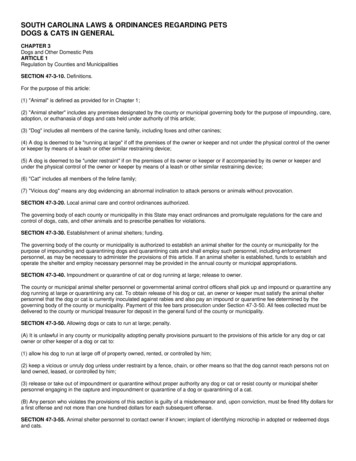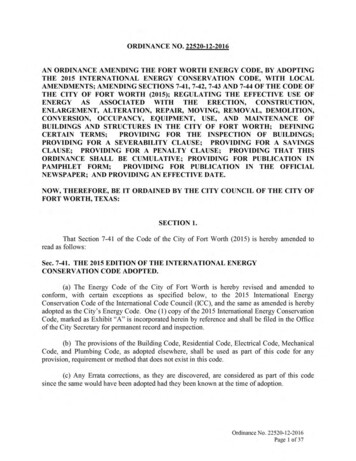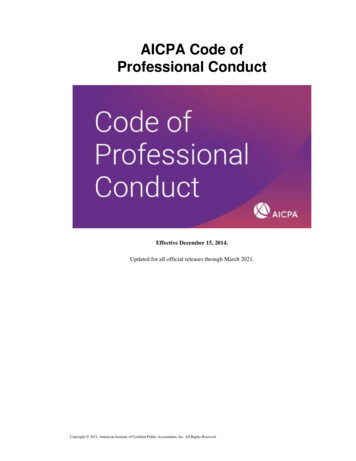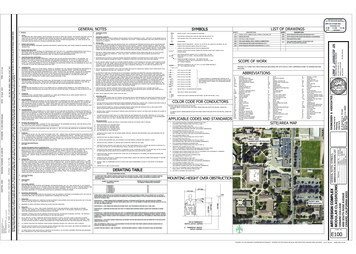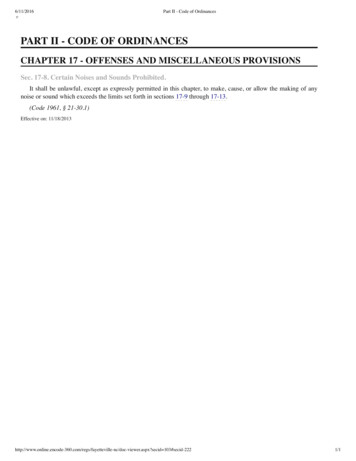
Transcription
6/11/2016Part II - Code of OrdinancesPART II - CODE OF ORDINANCESCHAPTER 17 - OFFENSES AND MISCELLANEOUS PROVISIONSSec. 17-8. Certain Noises and Sounds Prohibited.It shall be unlawful, except as expressly permitted in this chapter, to make, cause, or allow the making of anynoise or sound which exceeds the limits set forth in sections 17-9 through 17-13.(Code 1961, § 21-30.1)Effective on: yetteville-nc/doc-viewer.aspx?secid 103#secid-2221/1
6/11/2016Part II - Code of OrdinancesPART II - CODE OF ORDINANCESCHAPTER 17 - OFFENSES AND MISCELLANEOUS PROVISIONSSec. 17-9. Terminology and Standards Regarding Noises and Sounds.a. Terminology and standards. All terminology used in the provisions of sections 17-7 through 17-16 not definedin subsection (b) of this section, shall be in conformance with applicable publications of the American NationalStandards Institute (ANSI) or its successor body.b. Definitions.Ambient Sound means the total noise in a given environment.Effective on: 11/18/2013A-Weighted Sound Level means the sound pressure level in decibels as measured on a sound level meterusing the A-weighting network. The level so read is designated dB(A).Effective on: 11/18/2013A-Weighted Sound Level Meter means an instrument which includes an omnidirectional microphone, anamplifier, an output meter, and frequency weighting network for the measurement of sound. For purposes ofmeasuring A-weighted sound level, the Quest Model 215 Sound Level Meter and the 3M Noise EnforcementSound Level Meter Model 3220 are A-weighted sound level meters.Effective on: 11/18/2013Background Noise means ambient sound.Effective on: 11/18/2013Classification of Use Occupancies. For the purpose of defining the "use occupancy" all premises containinghabitually occupied sleeping quarters shall be considered in residential use. All premises containing transientcommercial sleeping quarters shall be considered tourist use. All premises containing businesses where sales,professional, or other commercial use is legally permitted shall be considered commercial use. All premises wheremanufacturing is legally permitted shall be considered manufacturing use. In case of multiple use, the morerestrictive use category shall prevail. Hospitals, nursing homes, schools, libraries, and church uses shall beconsidered residential uses. Any area not otherwise classified shall conform to commercial standards.Effective on: 11/18/2013Decibel (dB) means a unit for describing the amplitude of sound, equal to 20 times the logarithm to the base10 of the ratio of the pressure of the sound measured to the reference pressure, which is 20 micronewtons persquare meter.Effective on: 11/18/2013Emergency Work means any work performed for the purposes of preventing or alleviating physical trauma orproperty damage threatened or caused by an existing or imminent peril.Effective on: 11/18/2013Octave Band Sound Level means the sound pressure level in decibels of the sound within a specificfrequency band surrounding a specific center octave frequency (example: frequency band: 355-710 Hz; centeroctave frequency: 500 Hz), as measured on an octave band sound level meter set for measurement of sound levelwithin that octave band. The level so read is designated dB, followed in parentheses by the center frequency of theoctave band (example: 65 dB(500 Hz)).Effective on: 11/18/2013Octave Band Sound Level Meter means an instrument which includes an omnidirectional microphone, anamplifier, an output meter, and octave band filter for octave band sound level measurement. For purposes of eville-nc/doc-viewer.aspx?secid 103#secid-2231/2
6/11/2016Part II - Code of Ordinancesband measurement of sound level, the Quest Model 215-45 Octave Band Analyzer, combining the Quest 215Sound Level Meter and the Quest Model OB-45 Octave Band Filter, is an octave band sound level meter.Effective on: 11/18/2013Sound Pressure Level means 20 times the logarithm to the base ten of the ratio of the RMS sound pressure tothe reference of 20 micronewtons per square meter.Effective on: 11/18/2013Weekend means that period of time between 12:00 midnight on Friday to 12:00 midnight on Sunday.Effective on: 11/18/2013Sec. 17-9. Terminology and Standards Regarding Noises and Sounds. (Continued)c. Measurement of sound.1. Instrumentation.a. Measurement of A-weighted sound level as provided for in this chapter shall be made with a QuestModel 215 Sound Level Meter, a 3M Noise Enforcement Sound Level Meter Model 3220, or with someother sound level meter using the "A" weighting scale, in accordance with standards promulgated by theAmerican National Standards Institute.b. Octave band measurement of sound level shall be made with a Quest Model 215-45 Octave BandAnalyzer or with some other sound level meter capable of octave band measurement of sound level inaccordance with standards promulgated by the American National Standards Institute.2. Personnel. The operator of a sound level meter, but not persons assisting that operator with nontechnicalaspects of sound level measurement, must have received special training in sound measurement from anexpert or experts in sound measurement and must have received training in the use of the sound levelmeter used. The chief of police of the city shall prescribe minimum training standards for such operators.3. Measurement procedures. Sound level measurement, to include A-weighted and octave bandmeasurement, and recording of measurement readings shall be accomplished in accordance withprocedures approved by the chief of police of the city. These measurement procedures shall conform tothe operating instructions included in the operator's manual for the sound level meter used.d. Background sound. When the lowest sound level reading of the highest ten percent of readings taken during ameasurement period was ten or more decibels higher than the background sound level at the place ofmeasurement shortly before or after the measurement period, as prescribed in section 17-10, it shall bepresumed, for the purposes of the enforcement of sections 17-7 through 17-16, that the recorded sound levelsin excess of the applicable sound level limit were caused by the source of sound, the activation of whichcaused the sound level to exceed the background sound level. The period of measurement of backgroundsound level shall be at least one minute and readings shall be taken at five-second intervals. The proof ofbackground sound level shall not be required for enforcement of sections 17-7 through 17-16(Code 1961, § 21-30.2)Effective on: yetteville-nc/doc-viewer.aspx?secid 103#secid-2232/2
6/11/2016Part II - Code of OrdinancesPART II - CODE OF ORDINANCESCHAPTER 17 - OFFENSES AND MISCELLANEOUS PROVISIONSSec. 17-10. Maximum Permissible Sound Levels by Use Occupancy.a. No person shall operate or cause to be operated any source of sound from any occupancy in such a manner as tocreate a sound level which exceeds the limits set forth for the use occupancy category in Table 1 or Table 2 ofthis section more than five minutes, or ten percent of the sound level measurements taken at five-secondintervals during a measurement period of at least ten minutes, to be measured at or beyond the propertyboundary of the land use from which the sound emanates.Table 1Sound Levels by Use Occupance CategoryUser Occupancy CategoryTimeSound Level Limited dB(A)Residential or Public Space6 a.m.—10 p.m.6010 p.m.—6 a.m.556 a.m.—10 p.m.6510 p.m.—6 a.m.60At all times75Commercial or BusinessManufacturing, Industrial or AgriculturalTable 2Maximum Permissible Octave Bank Sound Levels by Use Occupancy Categoryand Frequency Band and Time of DayFrequencyResidential or Public SpaceCommercial or Business(Hz)6 a.m.—10 p.m.10 p.m.—6 a.m.6 a.m.—10 p.m.10 p.m.—6 14747b. Any source of sound which is the subject of a specific exemption or special permit in sections 17-7 through 1716 shall not be permitted to exceed by more than 15 dB(A) or dB in octave band measurement for all categoriesthose sound levels permitted in Table 1 or Table 2 of this section.(Code 1961, § 21-30.3)Effective on: yetteville-nc/doc-viewer.aspx?secid 103#secid-2241/1
6/11/2016Part II - Code of OrdinancesPART II - CODE OF ORDINANCESCHAPTER 17 - OFFENSES AND MISCELLANEOUS PROVISIONSSec. 17-11. Specific Prohibitions.In addition to the general prohibitions set out in section 17-10 and the maximum permissible sound levels setout in Table 1 of section 17-10, and unless otherwise exempted in section 17-12, the following specific acts, or thecausing or permitting thereof, are hereby declared to be unlawful:1. Radios, television sets, musical instruments and similar devices. Operating, playing, or permitting the operationor playing of any radio, television, phonograph, drum, musical instrument, or similar device which produces orreproduces sound:a. Between the hours of 10:00 p.m. and 7:00 a.m. in such a manner as to create excessive and unnecessarynoise across a residential real property line or within a noise sensitive area; orb. In such a manner as to exceed the levels set forth for the occupancy category set forth in Table 1 of section17-102. Loudspeakers. Using or operating for any purpose any loudspeaker, loudspeaker system, or similar devicebetween the hours of 10:00 p.m. and 7:00 a.m. on weekdays and 10:00 p.m. and 10:00 a.m. on weekends andholidays in areas within or adjacent to residential, commercial, or noise sensitive areas, except for anynoncommercial public speaking, public assembly, or other activity for which a special permit has been issued bythe chief of police.3. Street sales. Offering for sale, selling anything or advertising by shouting or outcry within any residential orcommercial area or noise sensitive zone of the city except by special permit issued by the chief of police.4. Animals. Owning, possessing, or harboring any animal or bird which frequently or for continued duration,howls, barks, meows, squawks, or makes other sounds which create excessive and unnecessary noise across aresidential or commercial real property line or within a noise sensitive zone. This provision shall not apply topublic zoos or private animal attractions operated for profit to which the public has general admission and whichare regulated by the city. This section shall not apply to dogs.5. Loading and unloading. Loading and unloading, opening, closing or other handling of boxes, crates, containers,equipment, building materials, garbage cans, or similar objects between the hours of 7:00 p.m. and 6:00 a.m. onweekdays and 7:00 p.m. and 8:00 a.m. on weekends or holidays in or within 50 yards of residential area or noisesensitive zone.6. Construction and demolition. Operating or causing the operation of any tools used in construction, drilling,repair, alteration, or demolition work between the hours of 9:00 p.m. and 6:00 a.m. on weekdays, or between9:00 p.m. and 9:00 a.m. on weekends or holidays in or within 50 yards of any residential area or noise sensitivezone, except for emergency work by public service utilities or by special permit issued by the chief of police.This section shall not apply to the use of domestic power tools as specified in subsection (11) of this section.7. Powered model vehicles. Operating or permitting the operation of powered model vehicles:a. Between the hours of 7:00 p.m. and 6:00 a.m. on weekdays and 7:00 p.m. and 10:00 a.m. on weekends orholidays in or within 100 feet of any residential areas or noise sensitive zone; orb. In such a manner as to exceed the levels set for public space land use, measured at a distance of not closerthan 100 feet (30 meters) from any point on the path of a vehicle operating on a public space or public rightof-way.8. Emergency signaling devices. The intentional sounding or permitting the sounding outdoors of any fire,burglary, or civil defense alarm, fire, whistle, or similar stationary emergency signaling device, except foremergency shall not occur before 7:00 a.m. or after 7:00 p.m., and any testing shall use the minimum cycle testtime appropriate for such devices, in no case to exceed 60 seconds. Testing of the complete emergency signalingsystem, including the functioning of the signaling device and the personnel response to the signaling eville-nc/doc-viewer.aspx?secid 103#secid-2251/3
6/11/2016Part II - Code of Ordinancesshall not occur more than once in each calendar month. Such testing shall occur only on weekdays and notbefore 7:00 a.m. or after 10:00 p.m., and shall be exempt from the time limit specified in this subsection. Thesounding or permitting the sounding of any exterior burglar or fire alarm or any motor vehicle burglar alarm,unless such alarm is automatically terminated within 15 minutes of activation, shall be prohibited.9. Motor boats. Operating or permitting the operation of any motor boat in any lake, river, stream, canal, bay, orother waterway in such a manner as to cause unnecessary and excessive noise within a residential area or noisesensitive zone, or to exceed 86 dB(A) when measured at least 50 feet from the craft.10. Noise sensitive zones. Creating or causing the creation of any sound within any noise sensitive zone so as toexceed the decibels levels set forth for such zone when measured at a distance of at least 25 feet (7.5 meters)from the sound source, provided that conspicuous signs are displayed indicating the presence of the noisesensitive zone or the creating or causing the creation of any excessive and unnecessary noise within or adjacentto any noise sensitive zone containing a hospital, nursing home, school, court or other designated area, providedthat conspicuous signs are displayed indicating the presence of the noise sensitive zone.11. Domestic power tools. Operating or permitting the operation of any mechanically powered saw, drill, grinder,lawn or garden tool, or similar tool between 10:00 p.m. and 6:00 a.m. on weekdays, or 10:00 p.m. and 7:00 a.m.on weekends and holidays, unless such equipment is operated inside a building or other structure so that thesound therefrom does not travel across any residential real property line or sensitive zone and exceed the levelsset forth in Table 1 of section 17-10. All such equipment shall be properly muffled and maintained in workingorder so as not to create excessive unnecessary noise.12. Multifamily dwellings. Operating or permitting the operation within a multifamily dwelling of any source ofsound in a manner so as to exceed 55 dB(A) from 7:00 a.m. to 10:00 p.m. or 45 dB(A) from 10:00 p.m. to 7:00a.m. on weekdays and 10:00 p.m. to 10:00 a.m. on weekends and holidays, when measured with an adjacentintrabuilding dwelling. These noise limits shall not be exceeded more than ten percent of any measurement,which shall not be less than ten minutes. The maximum permissible sound level, when measured in an adjacentintrabuilding area between 10:00 p.m. and 7:00 a.m. on weekdays and 10:00 p.m. and 10:00 a.m. on weekendsand holidays shall be 50 dB(A).13. Places of public entertainment. Operating or permitting to be operated any loudspeaker or other source of soundin any place of public entertainment that exceeds the level shown in Table 3, at any point normally occupied bya customer, without a conspicuous and legible sign stating, "WARNING" SOUND LEVELS WITHIN MAYCAUSE PERMANENT HEARING IMPAIRMENT.Table 3Permissible Noise ExposuresDuration per dayContinuous HoursNoise LeveldB(A)89069249539721001½1021105½110¼ or less11514. Refuse collection vehicles. No person shall collect refuse with a refuse collection vehicle between the hours of7:00 p.m. and 6:00 a.m. on weekdays and 7:00 p.m. and 10:00 a.m. on weekends and holidays within aresidential area or noise sensitive zone.15. Recreational motorized vehicles operating off public right-of-way. No person shall operate or cause to beoperated any recreational motorized vehicle or motorcycle that exceeds the limits set forth in Table 1 of section17-10 off the public right-of-way in any residential or noise sensitive zone. This section shall apply to lle-nc/doc-viewer.aspx?secid 103#secid-2252/3
6/11/2016Part II - Code of Ordinancesmotorized vehicles or motorcycles whether or not duly licensed and registered.16. Morning to evening. Subject to the provisions of this chapter, the creation of any unreasonably loud, disturbingand unnecessary noise in the city between the hours of 7:00 a.m. and 10:00 p.m. within 100 yards of a dwellingunit, house, trailer or other building ordinarily occupied by another person, when such person who owns or is incontrol of such building has not given prior consent, or within 25 yards of a publicly maintained road or publicvehicular area, is prohibited.17. Nighttime. Subject to the provisions of this chapter, the creation of any unreasonably loud, disturbing andunnecessary noise in the city between the hours of 10:00 p.m. and 7:00 a.m. the following morning within 100yards of a dwelling unit, house, trailer or other building ordinarily occupied by another person, when suchperson who owns or is in control of such building has not given prior consent, or within 25 yards of a publiclymaintained highway or public vehicular area, is prohibited.18. Detrimental noise. Noise of such character, intensity and duration as to be detrimental to the life or health ofany individual is prohibited within the city, no matter what the distance of the source of such noise is to anydwelling unit, house, trailer or building occupied by such other person, unless the person in control of such unit,house, trailer or building has given specific consent for such noise to continue.19. Prohibited acts generally. The following acts, among others, are declared to be loud, disturbing andunnecessary noises in violation of this chapter, but such enumeration shall not be deemed to be exclusive:a. Blowing horns. The sounding of any horn or signal on any automobile, motorcycle, bus or other vehicle,except as a danger signal, so as to create any unreasonably loud or harsh sound or the sound of such devicefor an unnecessary and unreasonable period of time.b. Radios, phonographs, etc. The playing of any radio, phonograph or other musical instrument in such manneror with such volume, as to unreasonably annoy or disturb the quiet, comfort or repose of any person in anydwelling unit, house, trailer, building or other type of residence.c. Pets. The keeping of any animal or bird, which by causing frequent or long continued noise, shallunreasonably disturb the comfort and repose of any person in the vicinity.d. Use of vehicle. The use of any automobile, motorcycle or vehicle so loaded, or operated in such manner as tocreate an unreasonably loud or unnecessary grating, grinding, rattling or other noise.e. Blowing whistles. The blowing of any steam whistle attached to any stationary boiler, except to give noticeof the time to begin or stop work or as a warning of danger.(Code 1961, § 21-30.4)Effective on: yetteville-nc/doc-viewer.aspx?secid 103#secid-2253/3
6/11/2016Part II - Code of OrdinancesPART II - CODE OF ORDINANCESCHAPTER 17 - OFFENSES AND MISCELLANEOUS PROVISIONSSec. 17-12. Exemptions from Section 17-10.The following are exempt from the provisions of Table 1 of section 17-10:1. Lawn mowers and agricultural equipment during daylight hours (7:00 a.m. to 10:00 p.m.) when operated withall the manufacturers' standard mufflers and noise reducing equipment in use and proper operating condition;2. Nonamplified crowd noises resulting from the activities such as those planned by student, governmental orcommunity groups;3. Construction operations for which building permits have been issued or construction operations not requiringpermits due to ownership of the project by an agency of government; providing all equipment is operated inaccord with the manufacturers' specifications and with all standard equipment manufacturer's mufflers and noisereducing equipment in use and in proper operating condition;4. Noises of safety signals, warning devices, emergency pressure relief valves and bells and chimes of churches;5. Noises resulting from any authorized emergency vehicle when responding to an emergency call or acting intime of emergency;6. Any other noise resulting from activities of a temporary duration permitted by law and for which a license orpermit therefor has been granted by the city in accordance with this section. Regulation of noises emanatingfrom operations under permit shall be according to the conditions and limits stated on the permit and containedin this section;7. Noises made by persons having obtained a permit to use the streets;8. All noises coming from the normal operations of aircraft, not including scale model aircraft, and all noisesemanating from the Fayetteville Municipal Airport property within the NEF (Noise Exposure Forecast) zones asestablished by a survey dated April 1977, and maintained in the office of the airport director.(Code 1961, § 21-30.5)Effective on: yetteville-nc/doc-viewer.aspx?secid 103#secid-2261/1
6/11/2016Part II - Code of OrdinancesPART II - CODE OF ORDINANCESCHAPTER 17 - OFFENSES AND MISCELLANEOUS PROVISIONSSec. 17-13. Motor Vehicle Noise.a. No person shall drive or move or cause or knowingly permit to be driven or moved a motor vehicle orcombination of vehicles at any time in such a manner as to exceed the following noise limits for the category ormotor vehicle shown below. Noise shall be measured at a distance of at least 25 feet (7.5 meters) from the nearside of the nearest lane being monitored and at a height of at least four feet above the immediate surroundingsurface.SOUND PRESSURE LEVEL, dB(A)Speedlimit35mphorlessSpeedlimitover35mphSuch vehicles operated by interstate motor carriers (measured at least 35 feet from thecenterline of the traveled lane).9195Any other motor vehicle or any combination of vehicles towed by any motor vehicle.7680Motor vehicles with a manufacturer's gross vehicle weight rating (GVW) or grosscombination weight rating (GCWR) of 10,000 pounds or more, or any combination ofvehicles towed by such motor vehicle, except those operated by an interstate motorcarrier.b. This section shall apply to the total noise from a vehicle or combination of vehicles and shall not be construedas limiting or precluding the enforcement of any other provisions of sections 17-7 through 17-13 relating tomotor vehicle mufflers for noise control.c. No person shall operate or cause to be operated any motor vehicle unless the exhaust system of such vehicle is:1. Free from defects which affect sound reduction;2. Equipped with a muffler or other noise dissipative device; and3. Not equipped with any cut-out, bypass or similar device.(Code 1961, § 21-30.7)Cross reference— Motor vehicle and traffic, ch. 16.Effective on: yetteville-nc/doc-viewer.aspx?secid 103#secid-2271/1
6/11/2016Part II - Code of OrdinancesPART II - CODE OF ORDINANCESCHAPTER 17 - OFFENSES AND MISCELLANEOUS PROVISIONSSec. 17-14. Special Permits Re Relief from Allowable Noise Level Limits.Applications for a permit for relief from the maximum allowable noise level limits designated in sections 17-7through 17-13 may be made in writing to the chief of police or his duly authorized representative. Any permitgranted by the chief of police under this chapter must be in writing and shall contain all conditions upon which thepermit shall be effective. The chief of police or his duly authorized representative may grant the relief as appliedfor under the following conditions:1. General conditions and requirements. The chief of police may prescribe any reasonable conditions orrequirements he deems necessary to minimize adverse effects upon the community or the surroundingneighborhood, including use of mufflers, screens or other sound attenuating devices.2. Permits for entertainment. Permits may be granted for the purpose of entertainment under the followingconditions:a. The function must be open to the public; admission may be charged.b. The function must take place on public property or public vehicular areas of shopping centers in anarea zoned CIP as prescribed in Chapter 30 of this Code, pursuant to subsection (1) of this section.c. The function must be staged between the hours of 9:00 a.m. and 12:00 midnight.3. Other conditions. Special permits for nonentertainment special purposes may be issued under thefollowing conditions:a. 1. If the special purpose relates to the operation of a trade or business, that the special purpose not bein the ordinary course of that trade or business; or2. If the special purpose does not relate to the operation of a trade or business, that the specialpurpose not be an ordinary event in the affairs of the applicant; andb. If the special purpose be a recurring purpose, that it not recur more often than four times eachcalendar year; andc. 1. That the special purpose be absolutely necessary to the operation of the applicant's trade orbusiness; or2. If the special purpose does not relate to the operation of the trade or business, that the specialpurpose be compatible with the ordinary activities of the neighborhood in which the specialpurpose is to occur; andd. Except in emergency situations, as determined by the chief of police, the special permit may be issuedonly between 7:00 a.m. and 12:00 p.m. on weekdays; ande. The special permit may be issued for no longer than 15 consecutive days, renewable by furtherapplication to the chief of police.4. Exterior loudspeaker not permitted. No permit may be issued to permit the use of any loudspeaker orsound amplifying device on the exterior of any building which at any time exceeds the sound level limitsin Table 1 of section 17-10 except those used for emergency warnings.5. Appeal. Anyone aggrieved by the provisions of this section shall have the right to appeal the decision ofthe chief of police to the city council. The appeal shall be in writing and filed with the city clerk withinten days after the decision of the chief of police. Upon receipt of a notice of appeal, the city council shallgrant a hearing to the appellant at the next city council meeting, provided such notice of appeal isreceived by 5:00 p.m. of the Friday before such council meeting.6. At the hearing before the city council pursuant to an appeal as requested pursuant to subsection (5) of thissection, the city council shall hold a public hearing to determine whether issuance of the permit would bedetrimental to the public health, safety and welfare of the community. If the city council determines ille-nc/doc-viewer.aspx?secid 103#secid-2281/2
6/11/2016Part II - Code of Ordinancesthe issuance of the permit would not be detrimental to the public health, safety and welfare, the citycouncil shall specifically authorize the chief of police to issue the permit to the applicant. If the citycouncil determines that the issuance of the permit would be detrimental to the public health, safety andwelfare of the community, the city council shall so notify the applicant, and the chief of police shall notissue the permit.(Code 1961, § 21-30.6)Effective on: yetteville-nc/doc-viewer.aspx?secid 103#secid-2282/2
6/11/2016Part II - Code of OrdinancesPART II - CODE OF ORDINANCESCHAPTER 17 - OFFENSES AND MISCELLANEOUS PROVISIONSSec. 17-16. Noise from Radios, Tape Players, Loudspeakers, Sound Amplifiers.a. No person shall play, use, or operate, or permit to be played, used, or operated, any radio, tape recorder, cassetteplayer, or other machine or device for reproducing sound, if it is located in or on any of the following:1. Any public property, including any public street, highway, building, sidewalk, park, thoroughfare, or publicor private parking lot unless such person receives a special event or public assembly permit; or2. Any motor vehicle on a public street, highway, public space or within the motor vehicular area of any publicor private parking lot or park;and if at the same time the sound generated is audible at a distance of 30 feet from the radio, tape recorder, cassetteplayer, or other machine or device that is producing the sound.b. Possession by a person of any radio, tape recorder, cassette player or other machine or device for reproducingsound as enumerated in subsection (a) of this section, shall be prima facie evidence that such person operates, orthose persons operate, the radio, tape recorder, cassette player, or other machine or device for reproducingsound.(Code 1961, § 21-30.10; Ord. No. S2008-013, § 1, 8-11-2008)Effective on: yetteville-nc/doc-viewer.aspx?secid 103#secid-2301/1
6/11/2016Part II - Code of OrdinancesPART II - CODE OF ORDINANCESCHAPTER 17 - OFFENSES AND MISCELLANEOUS PROVISIONSSec. 17-17. Enforcement Responsibility for Control of Excessive Noise.a. Primary enforcement responsibility. The chief of police of the city shall have primary enforcementresponsibility for sections 17-7 through 17-16 as they relate to stationary sources and as they relate to motorvehicle sources.b. Powers of arrest or citation. Any police officer shall issue a citation for any violation under this article, exceptthey may arrest for instances when:1. The alleged violator refuses to provide the officer with such person's name and address and any proof thereofas may be reasonably available to the alleged violator; or2. The alleged violator refuses
6/11/2016 Part II - Code of Ordinances
